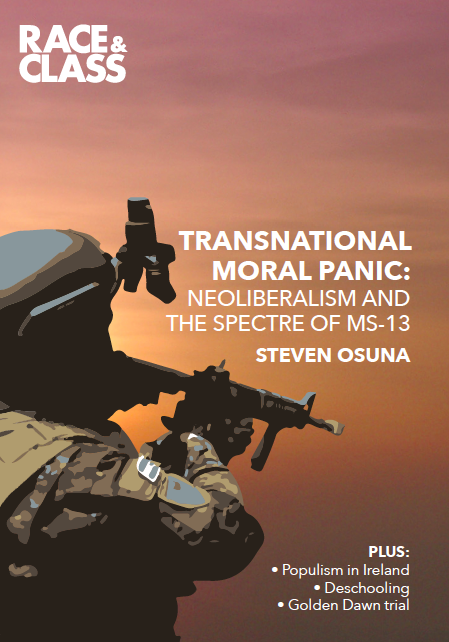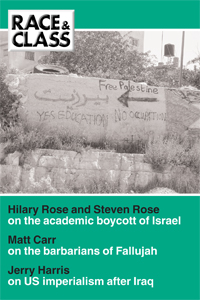Description
Reparations for ‘America’s Holocaust’ by Michael T Martin and Marilyn Yaquinto
The issue of reparations for the US’s long history of slavery is here explored in depth by Martin and Yaquinto. Placing their analysis in the post-September 11 context of a renewed drive to empire by the US administration and the rollback of civil liberties, the authors demonstrate how the reparations issue sheds light on the ongoing racial injustice of US society. Employing a race/class perspective, they show how the three basic strategies of the reparations movement – legal actions against institutions that profited from slavery; legislation to enable restitution; and political demands for reparations – are together creating the basis for the wider political mobilisation of African Americans, as evidenced in the Black Manifesto. In the process, the reparations movement is linking up with wider anti-globalisation struggles for justice, restitution and democracy.
Michael T. Martin is professor and chair of the Department of Ethnic Studies at Bowling Green State University, Ohio. Marilyn Yaquinto, also at Bowling Green State University, is a former journalist for the Los Angeles Times.
‘Poisoned bread’: protest in Dalit short stories by Shalini Ramachandran
The late 1960s and early 1970s saw a resurgence of anti-caste political struggle in India and an explosion of literature by writers from formerly ‘untouchable’ castes. And now, once again, the Dalit movement – which, in the 1970s aligned itself with the Black Panther movement of the US – is gathering in strength and mobilising power. Hence, Ramachandran’s analysis of Dalit literature from that earlier period (some of which is now available in English translation) is both timely and penetrating. Focusing on the collection Poisoned Bread, she underlines its importance not only as literary expression and as a social indictment of caste, but as a document of Dalit resistance.
Shalini Ramachandran is a lecturer in the Warren College Writing Program at the University of California, San Diego.
Eurocentrism in the history of mathematics by Dennis F Almeida and George Gheverghese Joseph
The astronomer/mathematicians of Kerala in southern India discovered and developed techniques of analysis that, in many respects, were the forerunners of those in use today. In this, they were several centuries in advance of European mathematical analysis. Yet, as Almeida and Joseph show, not only has their contribution not been acknowledged in the history of science, it has, on occasion, been downgraded – a state of affairs which can only be explained by the Eurocentric bias of much scientific historiography. And indeed, it is more than possible that Indian mathematical techniques were in fact transmitted to Europe, laying the foundation of much of our modern mathematics.
Dennis Almeida is a lecturer in mathematics education at the University of Exeter. George Gheverghese Joseph is the author of, among other works, The Crest of the Peacock: the non-European roots of mathematics and holds appointments at universities in Exeter, Manchester, Toronto and Trivandrum.
Venezuela – ripe for US intervention? By Sohan Sharma, Sue Tracy and Surinder Kumar
The installation of Hugo Chavez as president of Venezuela in 1998 marked a major and brave attempt by the people of Venezuela to break free both from the past that had imprisoned the country and a future that, under the dictates of neo-liberalism, held out little hope of improvement for the poor. Not surprisingly, as Sharma, Tracy and Kumar show, it is an attempt that is under constant threat from powerful vested interests. This article documents the salient features of Venezuelan history that continue to shape the country’s social and economic structure, analyses the current moves to reshape that structure and the challenges that are constantly being mounted against it.
Sohan Sharma is professor emeritus, California State University, Sacramento; Sue Tracy is a hazard waste scientist based in Sacramento and Surinder Kumar teaches at the Maharishi Dayanand University, Rohtak, India.
Deaths at Europe’s borders by Liz Fekete
That Europe is attempting to exert ever-stricter control over entry across its borders is well known. But what is less well understood is how these measures of control are, in themselves, contributing to an increasing death toll among those seeking to enter. Liz Fekete documents the loss of lives at sea as desperate migrants are forced into making ever-more circuitous and perilous journeys in unseaworthy vessels. And, while millions of euros are spent on sophisticated maritime surveillance projects, little is spent on averting the humanitarian disasters that result.
Liz Fekete is senior researcher on the European Race Audit of the Institute of Race Relations and is the author of Racism: the hidden cost of September 11.
Is another renaissance possible? By E G Vallianatos
Turning to the perennial lessons of Greek history for inspiration, Vallianatos throws a new light on the relationship between the US and Europe. In the process, he dissects the anti-humanist and anti-life nature of modern social and economic organisation and issues a lyrical call to imagine a new, possible future. ‘We need to invent a new science that is tainted not so much with power but with ethics, ecology and civilisation. Aristoteles argued that cataclysms repeatedly reduce human societies to a point where it is necessary to search in the rubble to rediscover human culture. We are not yet the refugees of a global catastrophe, but we are headed in that direction.’
E G Vallianatos is the author, among other works, of From Graikos to Hellene and Harvest of Devastation, and is a visiting professor of agrarian policy and the global environment at the University of Maryland.
Race & Class is published quarterly, in January, April, July and October, by Sage Publications for the Institute of Race Relations; individual subscriptions are £27/$47, for four issues, with an introductory rate of £20/$35 for new subscribers.



